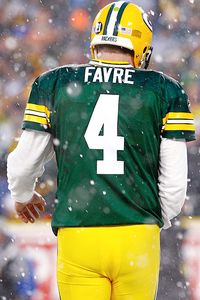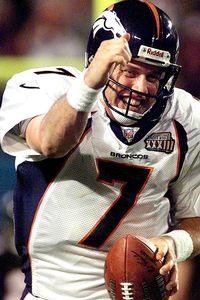
Jamie Squire/Getty Images
Brett Favre walked away from the game in March. Should the Packers be pushing him to return?
But do the Green Bay Packers want him back? With Aaron Rodgers apparently entrenched as the team's new starting quarterback, the Packers haven't reacted to reports that Favre has expressed interest in returning.
Perhaps a better question is this: Should the Packers want Favre back? With that tweak in mind, ESPN.com examined the departures of the 17 Hall of Fame quarterbacks who retired after the 1970 merger between the NFL and AFL. (George Blanda was excluded because his career as a full-time quarterback ended in 1965.)
Not surprisingly, the quarterback's team posted a better record the following year in only seven of the 17 instances. Otherwise, the team fared worse or the same. The Packers can't do much better than last season's 13-3 mark, but it's nevertheless worth noting the hardships most teams face when replacing a future Hall of Famer.
A look at the list:
Hall of Famer: Bart Starr
Team: Packers
Final season: 1971
Replacement: Scott Hunter
Victory differential: +6
Analysis: Starr passed the torch during the '71 season, playing only at the end of a lost season. Hunter led the Packers to their first playoff berth in five seasons in '72.
Hall of Famer: Johnny Unitas
Team: Colts
Final season: 1972
Replacement: Marty Domres
Victory differential: -1
Analysis: Unitas played one final year for the Chargers while the Colts moved on under new coach Howard Schnellenberger. Domres gave way to Bert Jones in '73.
Hall of Famer: Sonny Jurgensen
Team: Redskins
Final season: 1974
Replacement: Billy Kilmer
Victory differential: -2
Analysis: Kilmer took the Redskins to one playoff game over the following three seasons, eventually giving way to Joe Theismann in 1978.
Hall of Famer: Len Dawson
Team: Chiefs
Final season: 1975
Replacement: Keith Livingston
Victory differential: 0
Analysis: Livingston carried the torch for three seasons but never managed a winning record.
Hall of Famer: Joe Namath
Team: Jets
Final season: 1976
Replacement: Richard Todd
Victory differential: 0
Analysis: Namath played his final season with the Rams, while Todd's seven-year run included four playoff games.
Hall of Famer: Fran Tarkenton
Team: Vikings
Final season: 1978
Replacement: Tommy Kramer
Victory differential: -1
Analysis: Kramer had one of the better careers for Hall of Fame replacements, sticking around for parts of the next 11 seasons.
Hall of Famer: Roger Staubach
Team: Cowboys
Final season: 1979
Replacement: Danny White
Victory differential: +1
Analysis: White had a decent career as Staubach's replacement but couldn't get the Cowboys to the Super Bowl.
Hall of Famer: Bob Griese
Team: Dolphins
Final season: 1980
Replacement: David Woodley
Victory differential: +3
Analysis: Woodley took over in 1980 and got the Dolphins to the Super Bowl in 1982. Dan Marino replaced him the following season.
Hall of Famer: Terry Bradshaw
Team: Steelers
Final season: 1983
Replacement: Mark Malone
Victory differential: -1
Analysis: Bradshaw's last full season was '82. Cliff Stoudt was the primary quarterback in '83 before Malone took over in 1984.
Hall of Famer: Dan Fouts
Team: Chargers
Final season: 1987
Replacement: Mark Malone
Victory differential: -2
Analysis: Malone got used to the replacement gig, but the Chargers didn't return to the playoffs until Stan Humphries took over in 1992.
Hall of Famer: Joe Montana
Team: Chiefs
Final season: 1994
Replacement: Steve Bono
Victory differential: +4
Analysis: Montana's longtime understudy led the Chiefs to a 13-3 record at age 33.
Hall of Famer: Jim Kelly
Team: Bills
Final season: 1996
Replacement:Todd Collins
Victory differential: -4
Analysis: Collins lasted only one season before the Bills brought in Doug Flutie as their starter. Flutie had them in the playoffs in '98 and '99.
[+] Enlarge
JEFF HAYNES/AFP/Getty Images
The Broncos won the Super Bowl in John Elway's final season. A year later, they were 6-10.
Hall of Famer: John Elway
Team: Broncos
Final season: 1998
Replacement:Brian Griese
Victory differential: -8
Analysis: Griese was the surprise choice over Bubby Brister. The Broncos missed the playoffs for in '99 but returned in 2000.
Hall of Famer: Dan Marino
Team: Dolphins
Final season: 1999
Replacement: Jay Fielder
Victory differential: +1
Analysis: Marino considered an offer from Minnesota before retiring. Fiedler beat out Damon Huard and lasted until 2003 as the starter.
Hall of Famer: Steve Young
Team: 49ers
Year of Departure: 1999
Final season:Jeff Garcia
Record differential: +2
Analysis: Young departed in the midst of a rebuilding mode. Garcia had the 49ers in the playoffs by 2001.
Hall of Famer: Troy Aikman
Team: Cowboys
Final season: 2000
Replacement: Quincy Carter
Victory differential: 0
Analysis: The Cowboys were not prepared for Aikman's departure. Carter and Chad Hutchinson kept the seat warm until Bill Parcells brought in Vinny Testaverde and later Drew Bledsoe.
Hall of Famer:Warren Moon
Team: Seattle
Final season: 1998
Replacement:Jon Kitna
Record differential: +1
Analysis: Moon spent the '99 and 2000 seasons as a backup in Kansas City. Kitna held on for two years until coach Mike Holmgren changed direction with Matt Hasselbeck.
Haydar sets AHL playoff scoring records
Favre’s old locker going into retirement with him